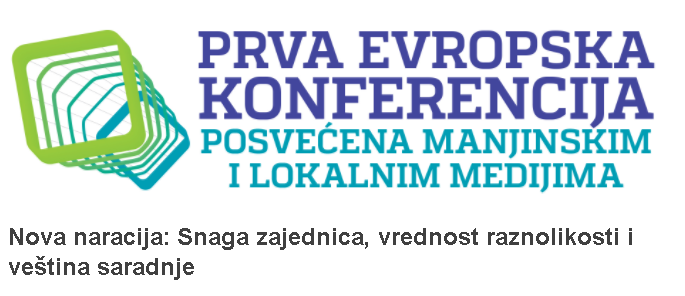One of the most important processes for further development of minority and local media, as well as other organisations and institutions that are part of public dialogue, is the establishment of the cooperation and partnership network. This was the primary conclusion of the First European Conference Dedicated to Minority and Local Media, held in Sremski Karlovci and Novi Sad on 16 and 17 November, and implemented within the Plus Days of Interculturality of the ‘Novi Sad 2021’ Foundation.
The first day of the conference was marked by the establishment of the media network of minority media for the Novi Sad 2021 – European Capital of Culture project through theoretical training of the students of the Faculty for Management and journalists from minority media, as well as from the Radio Television of Vojvodina. The gala opening of the conference was after the official part of the training. The audience was addressed by Nataša Heror from the Heror Media Pont, professor Goran Kvrgić PhD, Dean of the Faculty for Management, Mirjana Kovačević PhD, PR Manager of the ‘Novi Sad 2021’ Foundation, Edita Slezáková, President of the MIDAS, and Nenad Milenković, Mayor of Sremski Karlovci..
Nataša Heror, Goran Kvrgić and Jurij Giacomelli signed the Cooperation Agreement, which will bring the cooperation between Heror Media Pont, Giacomelli Media and Faculty for Management to a higher level, with a message that only by joint, i.e. networked force the society can develop to benefit all citizens.
After signing the agreement, Jurij Giacomelli from the Giacomelli Media, Slovenian consulting firm, spoke about media management in the process of changes. Momčilo Bajac, Associate Professor of the Faculty for Management, gave a lecture on the role of minority media in the inclusion of minority communities in the Novi Sad 2021 project. The common ground of all these lectures was a need to network minority and local media on one side, and all stakeholders of the Novi Sad 2021 – European Capital of Culture project, which is above all else a social project, on the other. The legacy of this project should be felt by all citizens of Novi Sad, because its importance goes beyond the cultural frame, so the segment of connection and cooperation is crucial, said Jurij Giacomelli and Momčilo Bajac. Mirjana Kovačević PhD and Lazar Jovanov PhD from the ‘Novi Sad 2021’ Foundation explained the content and the message of the ECoC project.
The first day of the conference was closed by Marija Vrebalov, consultant for accessible communication. She held a lecture on accessible communication, which has recently entered public dialogue thanks to cooperation between Heror Media Pont, ‘Novi Sad 2021’ Foundation and Magyar Szó daily in Hungarian.
The second day of the conference under the motto ‘New Narration: the Strength of Communities, Value of Diversity and Cooperation Skills’, was officially opened by Miroslav Štatkić, Provincial Secretary for Culture, Public Information and Relations with Religious Communities. During the second conference day, which brought together representatives of media, cultural institutions and national and provincial institutions from Serbia and Europe, participants discussed, presented and initiated new projects, campaigns and initiatives.
Some of the campaigns, which have officially started are the campaign for accessible communications and establishment of the minority media network, which will communicate the story of the Novi Sad 2021 – European Capital of Culture project. The Minority SafePack initiative, launched by the Federal Union of European Nationalities (FUEN), was also presented. This initiative advocates drafting and implementation of the set of documents in order to preserve and support the identity of national and regional minority communities on the level of the European Union. Loránt Vincze, President of the FUEN, presented the initiative at the conference.
Nataša Heror, as a moderator, Miroslav Keveždi, culture and media theoretician from the Vojvodina Institute for Culture, Tijana Palkovljević Bugarski PhD, Director of the Gallery of Matica Srpska and Chairperson of the Managing Board of the ‘Novi Sad 2021’ Foundation, Marija Vrebalov, consultant for accessible media, Mirjana Kovačević PhD, PR Manager of the ‘Novi Sad 2021’ Foundation and Márta Varjú, Editor in Chief of the Magyar Szó discussed cultural diversity in the context of minority media and culture.
The main topic of the second panel was ‘New Media and Innovative Environment’. The moderator Dalila Ljubičić from the Association of Serbian Media analysed the possible innovations in media with Marjan Curkov from the Government’s Office of Slovenia, Aleša Valtrič, Editor in Chief of the ‘Primorski Dnevnik’ from Slovenia, Attila Márton, Editor in Chief of the second channel of TV Vojvodina, and Saša Trifunović, Editor in Chief of the www.istmedia.rs portal. They stressed that each type of media and innovation must respect the journalism ethics. In this regard, the panellists underlined the importance of media literacy, which was included in the strategy of educational system of Serbia with an appeal to implement it in schools.
During the third panel, which was international in character, the moderator Jurij Giacomelli initiated a discussion on how to follow minority and majority media. He was aided by representatives of minority media from Slovakia, Germany, Basque Country, Finland and Romania: Edita Slezáková, Director of Új Szó – Hungarians in Slovakia, Jørgen Møllekær, Editor in Chief of the Flensborg Avis – Danes in Germany, Martxelo Otamendi, Director of Berria – Basque Country, Tomi Westerlund, journalist editor of the Hufvudstadsbladet – Swedes in Finland, and Balázs Bence from Szabadság – Hungarians in Romania.
The fourth panel opened the topic of Europe and minority media. It was discussed by moderator Bojan Brezigar, Loránt Vincze, Federal Union of European Nationalities (FUEN), Đorđe Vukmirović, Assistant of the Provincial Secretary for Culture, Public Information and Relations with Religious Communities, and Tamara Vlaškalin, Advisor in the institution of Commissioner for Protection of Equality.
The highlight of the second day of the conference was the opening of the exhibition ‘Phoenix from the Anton Chekhov Street’ by the photographer Csilla Dávid. This exhibitions is photo-memory of the restoration of the Egység château, the venue of the conference, which had been neglected for years to be finally restored recently. Ágnes Ózer PhD, museum advisor and historian from the City Museum of Novi Sad, spoke about the exhibition.
This event, which connects minority and local media with other sectors, and contributes to efforts that minority media become an important factor in objective reporting, was organised by Heror Media Pont, Giacomelli Media, Centre for Development of Minority and Local Media, Magyar Szó, Media Association in cooperation with MIDAS and Faculty for Management.
The First European Conference Dedicated to Minority and Local Media was supported by the Ministry of Culture and Information, Provincial Secretariat for Culture, Public Information and Relations with Religious Communities, Provincial Secretariat for Education, Regulations, Administration and National Minorities – National Communities, City Administration for Culture of Novi Sad and ‘Novi Sad 2021 – European Capital of Culture’ Foundation.
Source: www.mediapoint.org Photos by: Ótos András




